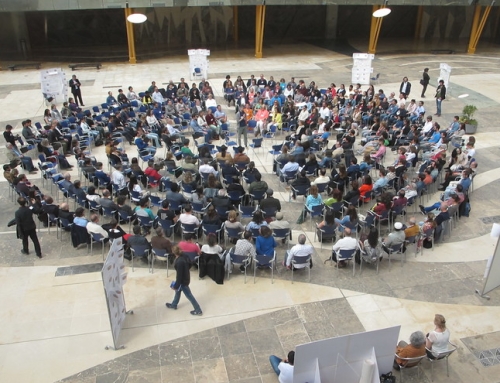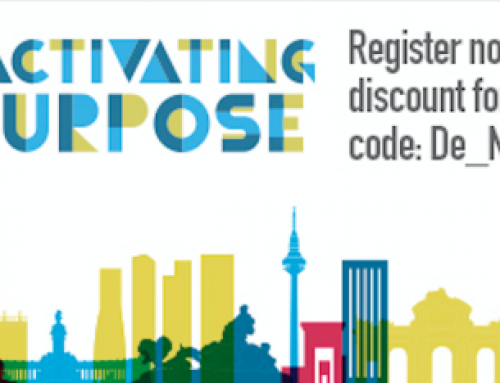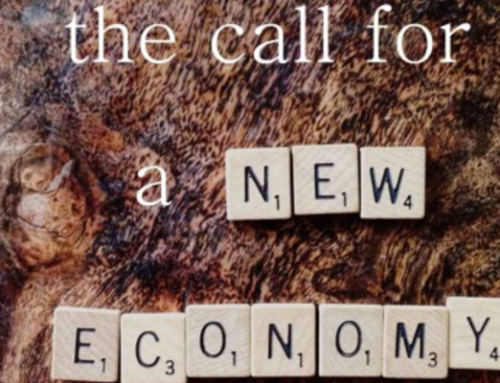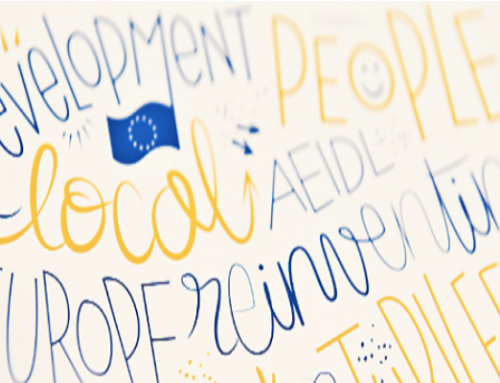ORGANIZATIONAL PARADIGMS FOR A NEW ECONOMY
Our current business model is more than a century old and is built on premodern traditional and modern industrial rational structures based on a linear and Newtonian world view. It is founded on some questionable premises and it has clear limitations that are becoming more and more apparent.
Going beyond the mere denounce of the conventional business model, some theories and models are laying out the foundations for a new management paradigm. As a result, a revolutionary way of managing organizations is emerging and my prediction is that it is going to be the norm in the future. Important companies such as Whole Foods, Zappos, Ben and Jerry’s, L.L. Gore, Semco or Buurtzorg are already being managed that way, and they are only the visible side of an iceberg that could sink business as usual.
The purpose of this article is to be a modest guide on some of the theories that are defining this new management paradigm. Obviously the list is not all inclusive, so I apologize in advance if I have not included your theory or your theory of choice.
If, as the Beatles sang, you say you want a revolution, and you believe another business is possible, here you got some real solutions to make business and organizations more humane, socially responsible and sustainable.
CULTURAL THEORIES
These set of theories focus in the evolution of culture and values in business. The underlying assumption they all share is that the system of beliefs and values that shaped our organizations during the twentieth century is just not good enough today and they try to describe the cultural traits of the organizations of the future.
Cultural transformation and Value assessment: Richard Barrett is one of the true pioneers and should be considered as one of the gurus of the new management paradigm. He is responsible for developing the theory of the Universal Stages of Evolution, the concepts of personal and cultural entropy, and creating assessment instruments to map the values of individuals and collectives to his Seven Levels of Consciousness Model. He put it all together in the Cultural Transformation Tools (CTT).
Managing by values: Dolan, García and Richley draw upon Plato’s philosophy to propose a triaxial theory to understand organizational culture as a combination of three groups of values: 1) economic-pragmatic values; 2) ethical-social values; and 3) emotional-developmental values. They advocate an evolution of conceptual management approaches from Management by Instructions and Management by Objectives towards Management by Values, a model based on a shared system of values between the owners and employees of companies.
Deliberately developmental organizations: Harvard Professor Robert Kegan coined the term Deliberately Developmental Organization (DDO) in his book An Everyone Culture to explain the phenomena of organizations and businesses that develop cultures with a specific approach to growth that consider the development of each employee of the organization at least as important as the bottom line. Kegan argues that those organizations outperform the average organization in profits and employee satisfaction.
ECONOMIC THEORIES:
This block is about theories and movements whose main interest is economics in general, but that also include management and organizations as subtopics.
Economy for the Common Good: A very influential social movement initiated by Christian Felber advocating for an alternative economic model. It calls for organizations working towards the common good and cooperating rather than only making money and competing. Its more important tool is the “common good balance sheet”, which evaluates organizations on how cooperative they are with other companies, whether their products and services satisfy human needs, and how humane their working conditions are. A score is awarded accordingly.
Memenomics: A theoretical framework developed by Said Dawlabani that applies the Spiral Dynamics model to economics. By integrating economic development with human development, memenomics provides a whole systems understanding of the historic trajectories of the past economic theories and potential solutions for a healthier “next generation economic system” and business model.
Conscious capitalism: A movement initiated by John Mackey, Whole Foods CEO, and professor Raj Sisodia. Conscious capitalism is more about management than economics, but I have included it within this section because of its defense of capitalism as a valuable system. Conscious capitalism builds on the foundations of Capitalism but intends to elevate it to a more complex form conscious of its purpose, its impacts on the world and the relationships it has with its stakeholders. It is based on four principles: higher purpose, stakeholder integration, conscious leadership and conscious culture and management. Fred Kofmann should not be forgotten here, as he has a book devoted to conscious business, and his brilliant metamanagement trilogy follows similar principles.
SOCIAL RESPONSIBILITY THEORIES
These theories are concerned about increasing the responsibility of business towards society and the planet and accordingly, they develop a set of tools and practices for that purpose.
B Corps: A global movement of for-profit companies holding a private certification issued by B Lab. To be granted and to preserve certification, companies must receive a minimum score on an online assessment for “social and environmental performance”, satisfy the requirement that the company integrate B Lab commitments to stakeholders into company governing documents, and pay an annual fee.
Economy of communion: The Economy of Communion (EoC) was founded by Chiara Lubich in 1991 as an initiative of the Focolare Movement. It promotes an economic culture imprinted on the Christian values of communion, gratuity and reciprocity. They propose an alternative lifestyle to the dominant one within our capitalist system and is a concrete attempt to address acute social problems with businesses that are integral parts of their communities. Member businesses are required to commit a part of their profits to direct aid for those in need and another part toward nurturing a “culture of giving”.
INTEGRAL THEORIES
Since the American philosopher Ken Wilber first used the word “integral” to refer to his approach in 1995, integral theory has become one of the most influential theories of our times. Integral theory is the comprehensive study of reality from a holistic, all-embracing and non-marginalizing point of view. It has been applied to all fields of human knowledge including management and organization theory.
Many authors have applied integral theory to specific areas such as strategy, coaching, or organizational development, and have applied some of the integral tools (AQAL, spiral dynamics) to business and management, but the three theories that stand out in terms of comprehensiveness and relevance are:
Teal Organizations- The teal organization movement was started by Frederic Laloux with his book “Reinventing Organizations”. The book resulted from two years of research about how organizations have evolved over time, using the Spiral Dynamics Integral (SDI) model as a frame of reference, and it identifies the emergence of a new management paradigm. The Teal paradigm refers to the next stage in the evolution of human consciousness according to the colour scheme used by SDI. Organizations of this type consciously operate as complex adaptive systems based on evolutionary purpose, with distributed authority, structured as decentralized, self-managing teams or networks and that encourage wholeness so people have the opportunity to present themselves fully at work.
3D Management: An integrally built metatheory of management developed by Marco Robledo (yes, that’s me). It stands for Three-Dimensional Management, in reference to three fundamental and irreducible dimensions: science, arts and ethics, which refer respectively to the techno-economical, the developmental- emotional and the moral aspects of organizational reality. Those three are integrated in an essential unit by fourth one, the spiritual dimension, which strives for unity and meaning. 3D Management denies the absolutist imperialism of the economic in business and replaces it by a harmonic triumvirate that takes equally into account other objectives such as the vertical development of people and social responsibility and total stakeholder orientation, all of them integrated towards a higher purpose.
Integral Leadership: Leadership is the area of management that has received more attention by integral theory (there is even a journal devoted to it, the Integral Leadership Review). One of the more important contributions to recent leadership theory comes from Brett Thomas. His integral leadership theory attempts to integrate all major styles of leadership, as a result of the recognition that all of them will work with some of the people some of the time, but no single approach works with all types of people all of the time. Accordingly, Thomas has developed a breakthrough model called the Leadership Rosetta Stone. The tool correlates four universal leadership styles with the four most common worldviews according to Spiral Dynamics.
ORGANIZATIONAL THEORIES
The organizations of the future will surely be more person centric. Democracy, transparency, no hierarchies and self-management are common characteristics of this kind of organizations. This is not as new as it sounds, self-management has been used by traditional companies such as General Electric, and Xerox in their quest for productivity and profits since the seventies, lean manufacturing (as developed by Toyota and Honda) has self-organization as one of its fundamental principles (and has influenced general management theories like radical management). Software developers were also self-organizing pioneers with their agile and scrum methodologies and there are agile management models for all kinds of organizations. Still sounds like anarchy? So what? Anarchy means “without bosses”, not “without order”. There are models devoted to define the structure and operating system of this kind of organizations:
Sociocracy is a collaborative governance method based on effective organization, distributed authority, and inclusive decision-making based on cybernetic principles. Modern sociocracy was initially developed by Gerard Endenburg in the 1960s and it is currently in its 3.0 version.
Holacracy is a comprehensive practice for structuring, governing, and running an organization. Clearly inspired by sociocracy, it was developed by Brian Robertson in his firm Ternary Software and later marketed by his consulting company HolacracyOne LLC. It replaces the traditional management hierarchy with a peer-to-peer “operating system” of self-organizing teams. Encode is another important contributor to the development of holacracy.
An article by: Marco Antonio Robledo (PhD, MBA), full professor of management at the University of the Balearics Islands (Spain) and director of the MBA program of the same university. He defines himself as a change agent that helps organizations and individuals in their integral development and transformation towards higher levels of consciousness. He is the author of a pioneer integral theory of management called 3D-Management and the founder and leader of the 3D Management Club of Conscious Organizations.







Leave A Comment